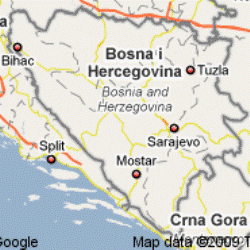At the opening, on Monday 25 February 2013, of the 22nd session of the United Nations Human Rights Council the Deputy Chairman of the Council of Ministers and Minister of Foreign Affairs of Bosnia-Herzegovina, Zlatko Lagumdzija, announced that whilst giving a high priority to the respect of human rights and fundamental freedoms Bosnia-Herzegovina will “in the short period of time [fulfil its] obligations deriving from the decision of the European Court of Human Rights on the Sejdic Finci case.”
Download the full speech on the right.
The European Court of Human Rights judged in the case Dervo Sejdic & Jakob Finci vs Bosnia-Herzegovina that the country is discriminating against national minorities. Sejdic and Finci complained against their ineligibility to stand for election to the House of Peoples and the Presidency of Bosnia-Herzegovina on the ground of their Roma and Jewish origin.
“Nothing has been made to fulfil the obligations in practice. Nothing has changed for a while and nothing allows us to say that we are today closer to changing the constitution than some time ago,” said the Executive Director of the Human Rights House Sarajevo, Srdjan Dizdarevic, in reaction from Sarajevo to the Minister’s promisses at the Human Rights Council.
The United Nations Committee on the Elimination of Racial Discrimination, as well as the United Nations Human Rights Committee, have also considered the restrictions to the access to the Parliament and Presidency as a discrimination.
In reaction to the Minister’s intervention at the Human Rights Council, the Human Rights House Foundation’s Head of Advocacy, Florian Irminger, said that “all international institutions, including the European Court, the Parliamentary Assembly of the Council of Europe and the United Nations treaty bodies have requested Bosnia-Herzegovina to take concrete steps to amend the constitution of all discriminatory measures. Bosnia-Herzegovina has to act with real and concrete policies and should present a plan of action to modify the constitution, not only make promises.”
Some progress on prevention of discrimination was made last year when Bosnia-Herzegovina’s government adopted legislation which prohibits discrimination based on race, color, language, religion, ethnicity, national or social origin, national minority, etc. However, the removal of discriminatory provisions in the Constitution has not yet taken place.
One explanation for the poor implementation of policies aiming at preventing discriminations is the fact that Bosnia-Herzegovina’s authorities consistently misinterpret the term “racial discrimination.” This represents a serious stumbling block for the promotion and realization of human rights: “Bosnia-Herzegovina authorities keep conceptualizing racial discrimination as discrimination based on the color of one’s skin, and do not understand that racial discrimination also encompasses ethnic and religious discrimination, segregation and intolerance,” said the Executive Director of the Human Rights House Sarajevo, Srdjan Dizdarevic. “Until Bosnia-Herzegovina authorities realize this, there will not be significant progress made in this field,” he concludes.
Documents:
- Human Rights Council Min Foreign Affairs intervention (February 2013)
Intervention of the Minister of Foreign Affairs of Bosnia-Herzegovina at the opening of the 22nd session of the Human Rights Council, on Monday 25 February 2013
Related articles:





